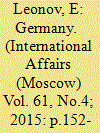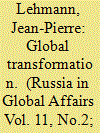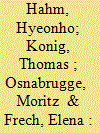| Srl | Item |
| 1 |
ID:
140587


|
|
|
|
|
| Summary/Abstract |
IT WAS NEARLY SEVENTY YEARS ago that the process of postwar settlement was completed in Europe which turned defeated Germany into a "political dwarf." Having spent these seven decades to become Europe's strongest socially-oriented market economy and a donor for its "small states," as well as Europe's main integration force, Germany can hardly claim the key role in international relations. It has no independent foreign policy course, the fact reconfirmed by its position on the Ukrainian crisis manufactured by the United States.
|
|
|
|
|
|
|
|
|
|
|
|
|
|
|
|
| 2 |
ID:
122369


|
|
|
|
|
| Publication |
2013.
|
| Summary/Abstract |
The profound transformations occurring in the global economy are inevitably causing disruption, confusion and tensions. The proposal for the establishment of a Transatlantic Trade and Investment Partnership between the U.S. and the EU might seriously exacerbate the situation and lead to the establishment of rival economic blocs.
|
|
|
|
|
|
|
|
|
|
|
|
|
|
|
|
| 3 |
ID:
169323


|
|
|
|
|
| Summary/Abstract |
What type of trade agreement is the public willing to accept? Instead of focusing on individual concerns about market access and trade barriers, we argue that specific treaty design and, in particular, the characteristics of the dispute settlement mechanism, play a critical role in shaping public support for trade agreements. To examine this theoretical expectation, we conduct a conjoint experiment that varies diverse treaty-design elements and estimate preferences over multiple dimensions of the Transatlantic Trade and Investment Partnership (TTIP) based on a nationally representative sample in Germany. We find that compared to other alternatives, private arbitration, known as investor-state dispute settlement (ISDS), generates strong opposition to the trade agreement. As the single most important factor, this effect of dispute settlement characteristic is strikingly large and consistent across individuals’ key attributes, including skill levels, information, and national sentiment, among others.
|
|
|
|
|
|
|
|
|
|
|
|
|
|
|
|